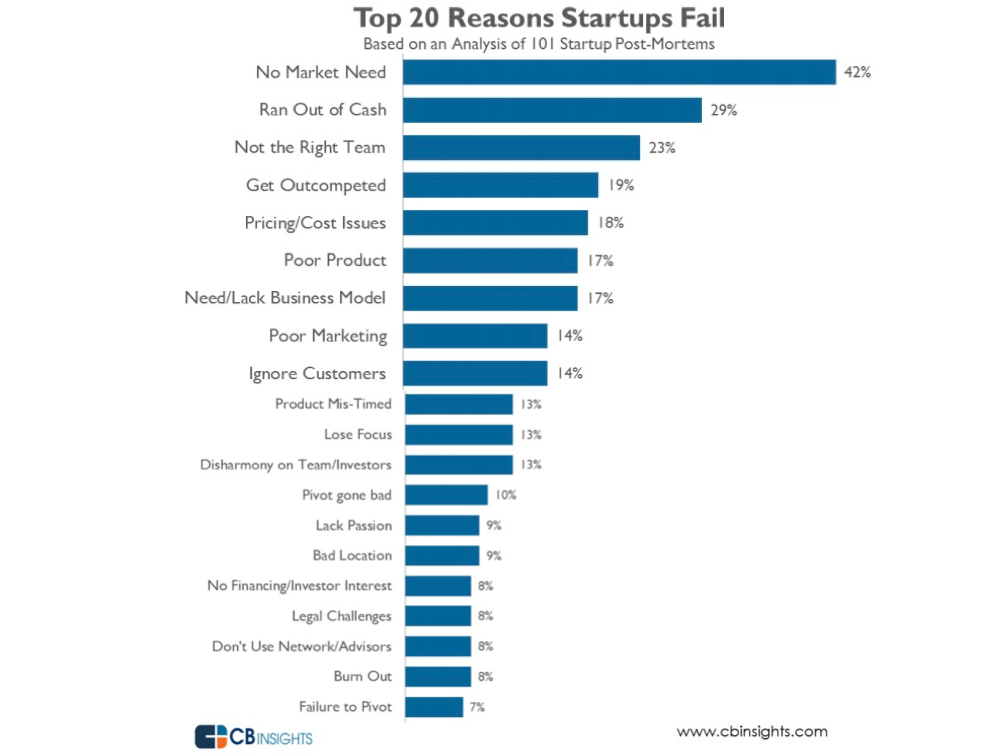In January, we shared how the startup-tracking firm CB Insights collected an impressive list of links to 51 blog posts and other sources in which the founders of failed startups provided some form of post-mortem explanation regarding the failure. The firm now has grown its list to 101 post mortems. And with this longer list, they have also analyzed the explanations to determine, “What are the most common excuses for failure?” (Except the CB Insights folks said it in a much kinder way: “Are there a few primary drivers of startup failure?”)
Top 20 reasons founders give for their startup failing
CB Insights came up with the 20 most frequently cited reasons for failure. (In the chart below, the reasons add up to more than 100% because some companies gave multiple reasons.) Here is a ranking of that list. The CB Insights blog and the accompanying free PDF analysis provide greater detail and examples of each of the reasons listed below.:
#20 – Failure to pivot when necessary
#19 – Burn Out
#18 – Did not use connections or network effectively
#17 – Legal Challenges
#16 – No Financing or Interested Investors
#15 – Location, Location, Location
#14 – Lack of Passion and Domain Expertise
#13 – Pivot Gone Bad
#12 – Disharmony with Investors/Co-founders
#11 – Lose Focus
#10 – Release product at the wrong time
#9 – Being inflexible and not actively seeking or using customer feedback
#8 – Poor Marketing
#7 – I got this product. Now I just need a business model.
#6 – A “User Un-Friendly” Product
#5 – Pricing/Cost Issues
#4 – Outcompeted
#3 – Not the right team
#2 – Ran out of cash
#1 – Building a solution looking for a problem, i.e., not targeting a “market need”
Top 20 reasons founders give for their startup failing (Chart)

(Click it enlarge. Source: CB Insights)
The real reasons startups fail
The CB Insights ranking is interesting, but it isn’t actually based on why the startups failed. Rather it is based on what the founders said or felt the reasons were. As anyone who has started a business that failed (yes, that would include me) can tell you, it sometimes takes years to fully comprehend everything that happened that caused the failure. And, more likely than not, all of the things you blamed earlier turn out to be results of a central cause, and not actual causes. (For example, burnout, loss of focus, not using networks, can all be traced back to a common cause: If your feel inside your business is failing, you quickly burn out, lose focus and don’t want to burn down the bridges that connect you with a network that can help you in the future.)
Also, in the big scheme of things, there are very few venture-backed startups among the new companies that are created annually. According to the NVCA (National Venture Capital Association), only about 1,000 startups receive venture capital for the first time each year. While angel investors may increase that number, the vast majority of businesses started each year in the U.S. are backed by the founders themselves. They may take out loans, but they likely will be required to collateralize such debt with real estate or other holdings. Even an SBA loan will require a personal guarantee. In other words, most new businesses aren’t created by people who use other people’s money.
For such businesses, there are only two things you need to succeed: Customers and profitability.
A small business owner who fails would not use the term “market need,” but would say, “We failed because we had no customers.” And by customers, I mean, the people who pay for what you are selling for a price more than what it takes to create and deliver that item or service. (Another way to say “profitability.”) And by people who pay, I mean anyone who writes a check.
Forget 20 reasons for failure. Most everything on the list can cause you to fail. However, if you have customers and a clear path to profitability, you will likely overcome the 18 other reasons listed.
